人教新目标(Go for it)版七年级下Unit 4 Don't eat in class. Section A 1a-1c课件(27张ppt)
文档属性
| 名称 | 人教新目标(Go for it)版七年级下Unit 4 Don't eat in class. Section A 1a-1c课件(27张ppt) | 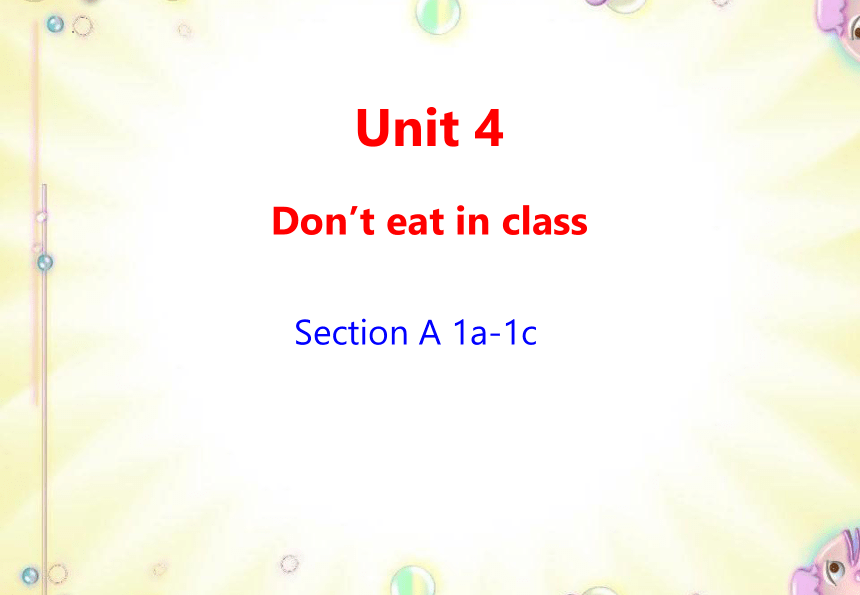 | |
| 格式 | zip | ||
| 文件大小 | 4.1MB | ||
| 资源类型 | 教案 | ||
| 版本资源 | 人教新目标(Go for it)版 | ||
| 科目 | 英语 | ||
| 更新时间 | 2022-03-05 20:50:00 | ||
图片预览

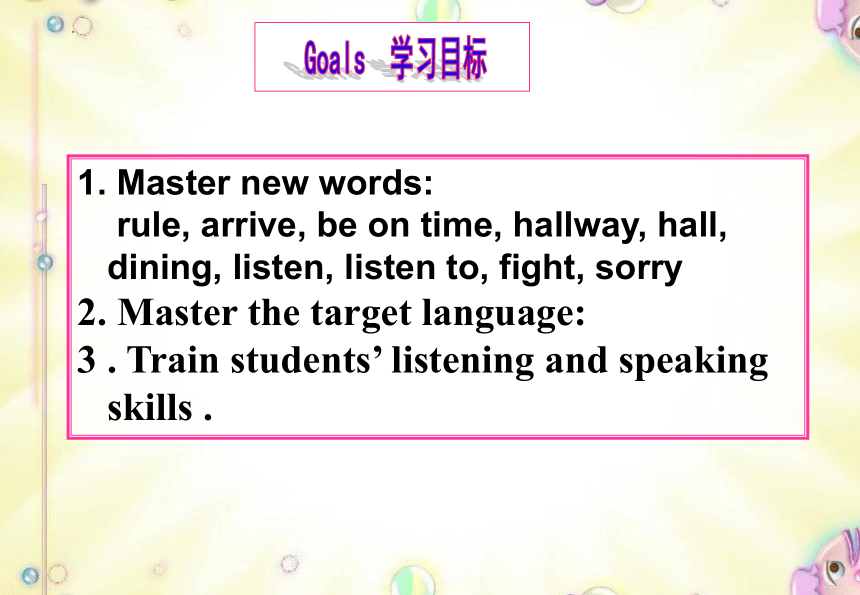
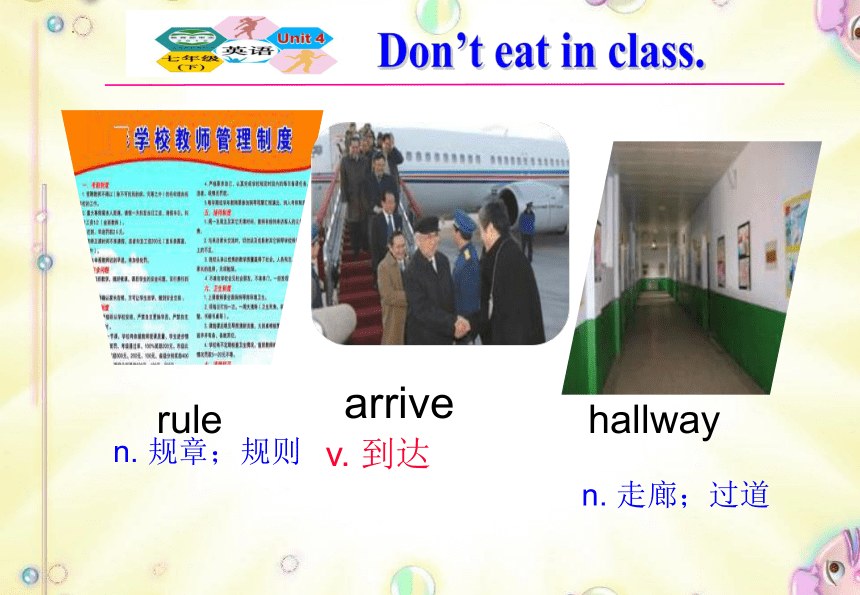
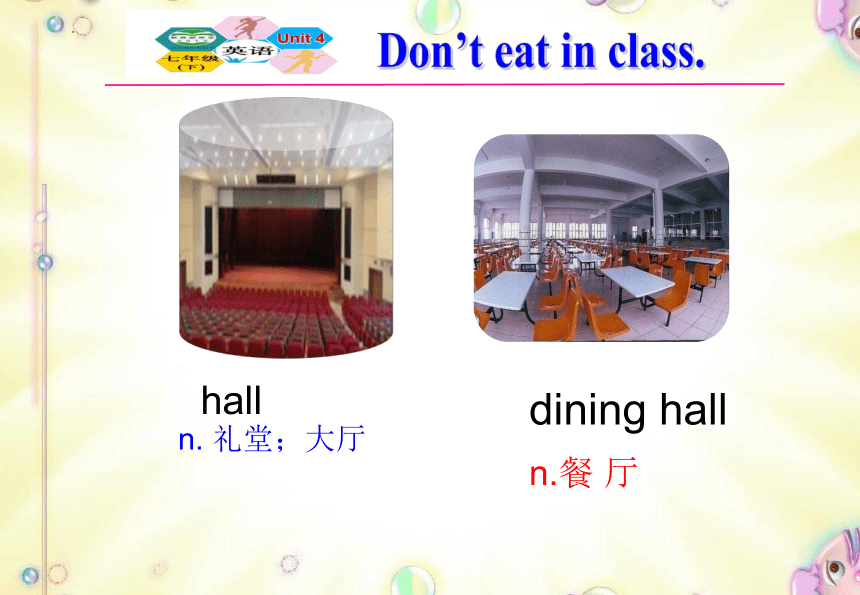
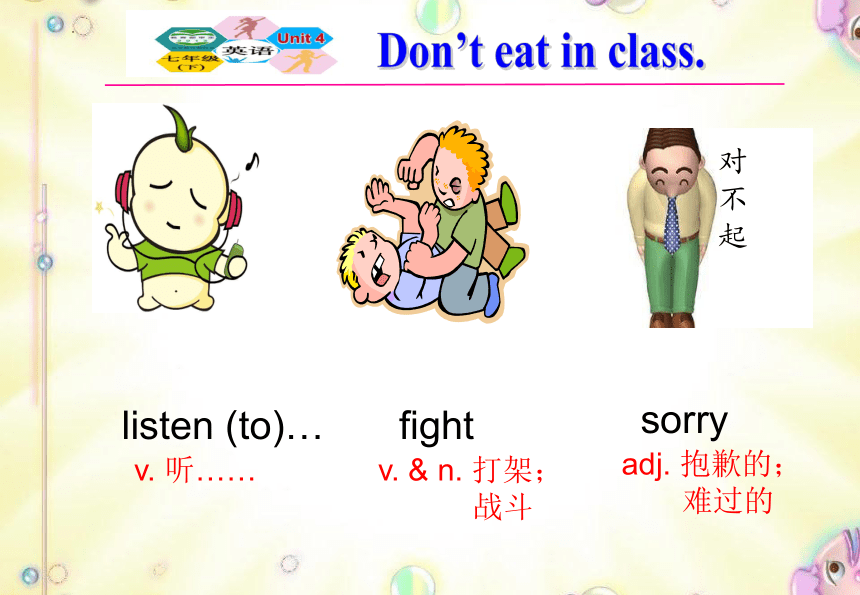
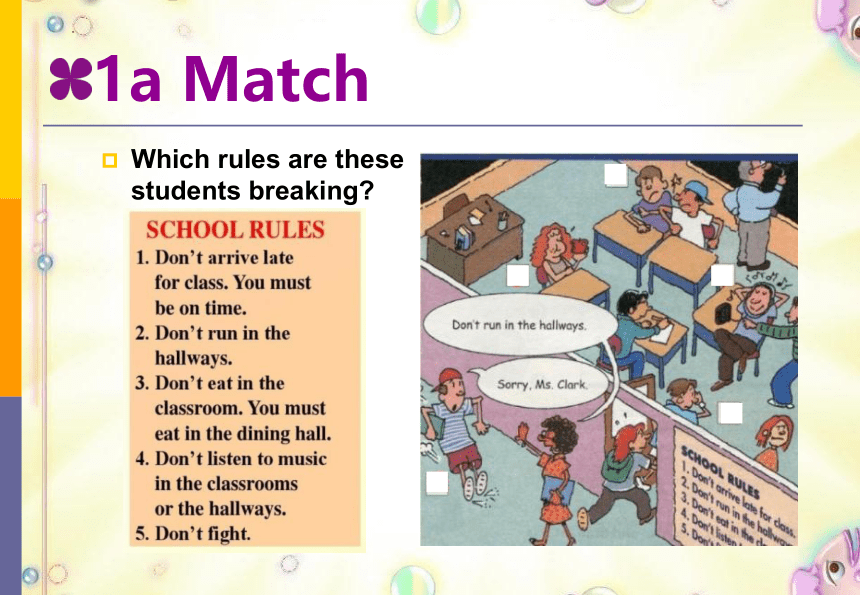
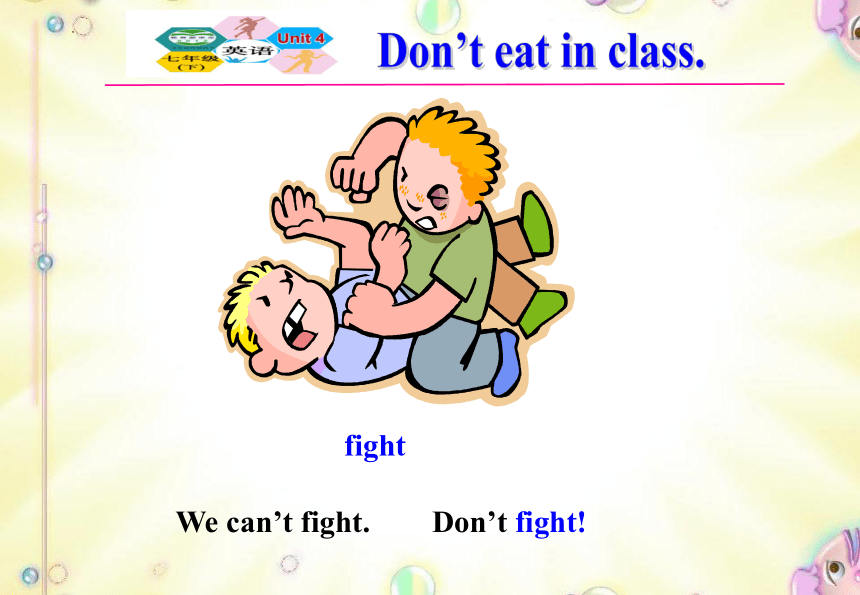
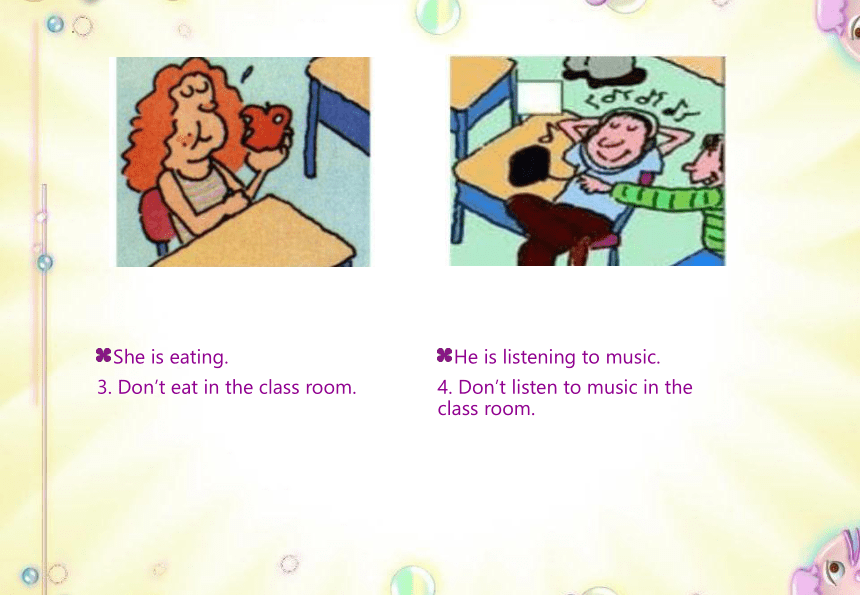
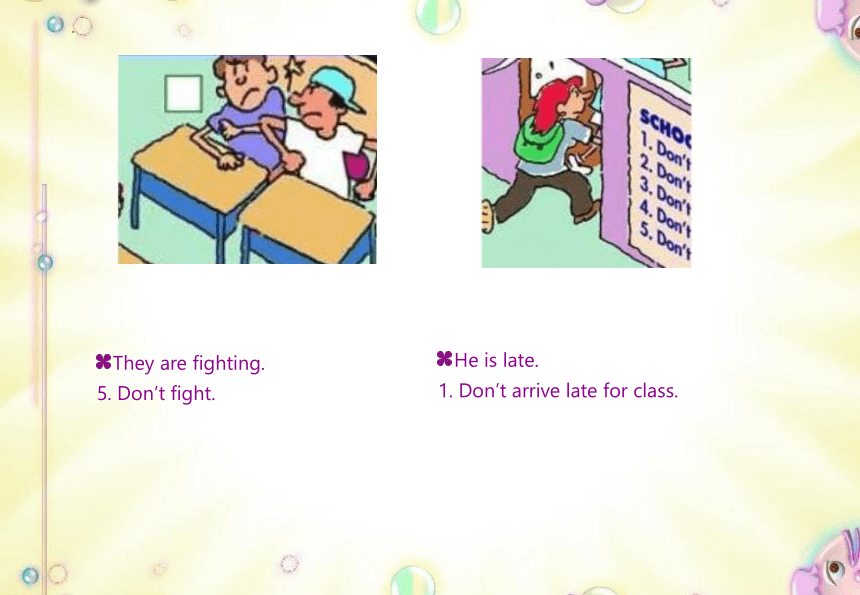
文档简介
(共27张PPT)
Unit 4
Don’t eat in class
Section A 1a-1c
Master new words:
rule, arrive, be on time, hallway, hall, dining, listen, listen to, fight, sorry
2. Master the target language:
3 . Train students’ listening and speaking skills .
Goals 学习目标
Don’t eat in class.
n. 规章;规则
rule
n. 走廊;过道
arrive
v. 到达
hallway
Don’t eat in class.
dining hall
n.餐 厅
n. 礼堂;大厅
hall
Don’t eat in class.
对不起
listen (to)…
v. 听……
fight
v. & n. 打架;
战斗
sorry
adj. 抱歉的;
难过的
Which rules are these students breaking
1a Match
fight
We can’t fight. Don’t fight!
Don’t eat in class.
She is eating.
3. Don’t eat in the class room.
He is listening to music.
4. Don’t listen to music in the class room.
They are fighting.
5. Don’t fight.
He is late.
1. Don’t arrive late for class.
Expressions
On time
Hallway
Dining hall
hallway
We can’t run in the hallways.
Don’t run in the hallways.
run in the hallways
Don’t eat in class.
listen to music
Don’t listen to music in class.
Don’t eat in class.
arrive late for school= be late for school
We can’t be late for school.
Don’t arrive late for school.
=Don’t be late for school.
We must be on time (for school).
Don’t eat in class.
dining hall
We can eat in the dining hall.
We can’t eat in the classroom.
Don’t eat in the classroom.
Don’t eat in class.
A: Can you arrive late for class
=arrive late for class
(上课迟到)
B: No, we can’t.
A: You must be on time.(必须准时)
be late for class
Don’t eat in class.
run in the hallways
A: Can we run in the hallways
B: No, we can’t.
Don’t eat in class.
(在 走 廊 里 跑)
Rule 2 Don’t run in the hallways.
What rules are these students breaking
(Try to catch the key words)
Peter
Amy
Mike
1b Listen and match
Run in the hallway
Eat in the classroom
Listen to music
2
3
4
Student B is telling the rules above to a new student.
1c Role-play
A: What are the rules
B: Well. We can’t arrive late for class.
We must be on time.
You can get extra GEMS when you can chat in different expressions.
Language points
1. Don’t arrive late for class.
不要上课迟到。
arrive vi. 到达
When did he arrive yesterday
昨天他什么时候到达的?
疑难点拨
arrive in / at与get to 的区别
① My father arrived in / got to Beijing this morning.
我爸爸今天上午到达了北京。
② The farmer arrived at / got to an old house and knocked at the door.
那个农民到达了一个旧房子前并且敲了敲门。
小结:
arrive + in (大地方)
at (小地方)
get 必须与to 搭配才能加宾语。后面如接地点副词,则不用介词to。
2. You must be on time.
你们必须守时。
1) must 作为情态动词,表示“必须”、“务必”,有时还表示“一定”,起到加强语气的作用。例如:
You must come tomorrow.
你(们)明天必须要来。
在回答must引起的问句时,如果是否定的答复,可用don’t have to或needn’t (不必) , 但不能用mustn’t (一定不, 必须不, 不允许, 不得) 。
2) on time 是一个固定介词短语,表示“按时;准时”。 例如:
We must get to school on time.
我们必须按时到校。
我们要按时完成任务。
We'll finish our job _________.
on time
3) 系动词be与形容词或介词短语联用,是英语一种常见的语句结构,表示某种状态。例如:
be quiet 保持安静;be strict 要求严格
be on time 守时;按时到;
be at work 在上班
例如:
You mustn’t be noisy, children.
孩子们,你们一定不可喧闹。
3. Don’t listen to music in class.
别在课上听音乐。
listen to … 听……
She is listening to the radio.
她在听收音机。
listen at the door 耳朵贴着门听
listen for … 留神等着听…
listen for an answer 等着听回答
listen to a lecture 听讲座
listen to advice 听从劝告
Discuss with your partners what rules
we should follow (遵守)in school.
Write down and make a report.
Don’t eat in class.
Homework
Unit 4
Don’t eat in class
Section A 1a-1c
Master new words:
rule, arrive, be on time, hallway, hall, dining, listen, listen to, fight, sorry
2. Master the target language:
3 . Train students’ listening and speaking skills .
Goals 学习目标
Don’t eat in class.
n. 规章;规则
rule
n. 走廊;过道
arrive
v. 到达
hallway
Don’t eat in class.
dining hall
n.餐 厅
n. 礼堂;大厅
hall
Don’t eat in class.
对不起
listen (to)…
v. 听……
fight
v. & n. 打架;
战斗
sorry
adj. 抱歉的;
难过的
Which rules are these students breaking
1a Match
fight
We can’t fight. Don’t fight!
Don’t eat in class.
She is eating.
3. Don’t eat in the class room.
He is listening to music.
4. Don’t listen to music in the class room.
They are fighting.
5. Don’t fight.
He is late.
1. Don’t arrive late for class.
Expressions
On time
Hallway
Dining hall
hallway
We can’t run in the hallways.
Don’t run in the hallways.
run in the hallways
Don’t eat in class.
listen to music
Don’t listen to music in class.
Don’t eat in class.
arrive late for school= be late for school
We can’t be late for school.
Don’t arrive late for school.
=Don’t be late for school.
We must be on time (for school).
Don’t eat in class.
dining hall
We can eat in the dining hall.
We can’t eat in the classroom.
Don’t eat in the classroom.
Don’t eat in class.
A: Can you arrive late for class
=arrive late for class
(上课迟到)
B: No, we can’t.
A: You must be on time.(必须准时)
be late for class
Don’t eat in class.
run in the hallways
A: Can we run in the hallways
B: No, we can’t.
Don’t eat in class.
(在 走 廊 里 跑)
Rule 2 Don’t run in the hallways.
What rules are these students breaking
(Try to catch the key words)
Peter
Amy
Mike
1b Listen and match
Run in the hallway
Eat in the classroom
Listen to music
2
3
4
Student B is telling the rules above to a new student.
1c Role-play
A: What are the rules
B: Well. We can’t arrive late for class.
We must be on time.
You can get extra GEMS when you can chat in different expressions.
Language points
1. Don’t arrive late for class.
不要上课迟到。
arrive vi. 到达
When did he arrive yesterday
昨天他什么时候到达的?
疑难点拨
arrive in / at与get to 的区别
① My father arrived in / got to Beijing this morning.
我爸爸今天上午到达了北京。
② The farmer arrived at / got to an old house and knocked at the door.
那个农民到达了一个旧房子前并且敲了敲门。
小结:
arrive + in (大地方)
at (小地方)
get 必须与to 搭配才能加宾语。后面如接地点副词,则不用介词to。
2. You must be on time.
你们必须守时。
1) must 作为情态动词,表示“必须”、“务必”,有时还表示“一定”,起到加强语气的作用。例如:
You must come tomorrow.
你(们)明天必须要来。
在回答must引起的问句时,如果是否定的答复,可用don’t have to或needn’t (不必) , 但不能用mustn’t (一定不, 必须不, 不允许, 不得) 。
2) on time 是一个固定介词短语,表示“按时;准时”。 例如:
We must get to school on time.
我们必须按时到校。
我们要按时完成任务。
We'll finish our job _________.
on time
3) 系动词be与形容词或介词短语联用,是英语一种常见的语句结构,表示某种状态。例如:
be quiet 保持安静;be strict 要求严格
be on time 守时;按时到;
be at work 在上班
例如:
You mustn’t be noisy, children.
孩子们,你们一定不可喧闹。
3. Don’t listen to music in class.
别在课上听音乐。
listen to … 听……
She is listening to the radio.
她在听收音机。
listen at the door 耳朵贴着门听
listen for … 留神等着听…
listen for an answer 等着听回答
listen to a lecture 听讲座
listen to advice 听从劝告
Discuss with your partners what rules
we should follow (遵守)in school.
Write down and make a report.
Don’t eat in class.
Homework
同课章节目录
- Unit 1 Can you play the guitar?
- Section A
- Section B
- Unit 2 What time do you go to school?
- Section A
- Section B
- Unit 3 How do you get to school?
- Section A
- Section B
- Unit 4 Don't eat in class.
- Section A
- Section B
- Unit 5 Why do you like pandas?
- Section A
- Section B
- Unit 6 I'm watching TV.
- Section A
- Section B
- Review of Units 1-6
- Unit 7 It's raining!
- Section A
- Section B
- Unit 8 Is there a post office near here?
- Section A
- Section B
- Unit 9 What does he look like?
- Section A
- Section B
- Unit 10 I'd like some noodles.
- Section A
- Section B
- Unit 11 How was your school trip?
- Section A
- Section B
- Unit 12 What did you do last weekend?
- Section A
- Section B
